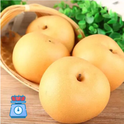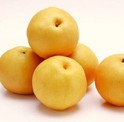As a supplier of Wonhwang Pears, I've been asked this question more times than I can count: "Does Wonhwang Pear need special handling during transportation?" Well, let me tell you, it's not a simple yes or no answer. There are a bunch of factors at play here, and I'm gonna break it all down for you.
First off, let's talk about what makes Wonhwang Pears so special. These pears are a real gem. They've got this beautiful golden - brown skin that just looks so inviting. And the taste? Oh man, it's sweet, juicy, and has this delicate flavor that's just to die for. They're not like your average pears you find at the grocery store. You can check out more about some other amazing pear varieties like Beautiful Pear Tree Fruit, Feng Shui Pear Fruit, and Whasan Pear on these links.
Now, back to the transportation question. Wonhwang Pears are pretty delicate. Their skin is thin, and they're easily bruised. You know how you'd be careful with a precious glass ornament? It's kinda the same deal with these pears. During transportation, even the slightest jolt or bump can cause damage. A bruise on a pear isn't just a cosmetic issue. Once the skin is broken or bruised, it becomes a gateway for bacteria and fungi. These little critters can start to rot the pear from the inside out, and that's a big no - no if you want to deliver fresh, high - quality pears to your customers.
Temperature is another huge factor. Wonhwang Pears are best stored and transported at a cool temperature. If it's too hot, the pears will ripen too quickly. You might end up with mushy, overripe pears by the time they reach their destination. On the other hand, if it's too cold, the pears can get damaged by the cold. It's like Goldilocks and the Three Bears - you need to find that just - right temperature. A good temperature range for transporting Wonhwang Pears is usually between 0°C and 4°C. This helps to slow down the ripening process and keeps the pears fresh for longer.
Humidity also plays a role. Pears need a certain level of humidity to stay fresh. If the air is too dry, the pears will lose moisture and start to shrivel up. But if it's too humid, there's a risk of mold growth. So, when transporting Wonhwang Pears, we need to make sure the environment has the right balance of humidity. Special containers or trucks with humidity - control systems can be really helpful in achieving this.
Packaging is key when it comes to transporting these pears. We can't just throw them in a box and hope for the best. They need to be packed in a way that protects them from damage. We usually use individual foam or paper sleeves for each pear. These sleeves act as a cushion, absorbing any shocks during transportation. Then, the pears are placed in sturdy boxes with dividers. The dividers keep the pears separated, so they don't bump into each other and get bruised.


Now, let's talk about the different modes of transportation. If we're shipping the pears locally, a well - insulated truck is usually a good option. The truck can be equipped with temperature and humidity control systems to keep the pears in optimal conditions. For longer distances, especially if we're exporting the pears, air freight might be the way to go. Air transportation is fast, which means the pears spend less time in transit. However, it can be more expensive. Sea freight is another option for international shipping. It's cheaper, but it takes longer. When using sea freight, we need to make sure the shipping containers are properly equipped to maintain the right temperature and humidity.
Another thing to consider is the timing of the harvest. We need to harvest the pears at the right stage of ripeness. If we harvest them too early, they might not develop their full flavor. But if we harvest them too late, they'll be too ripe and won't last long during transportation. It's a bit of a balancing act, but with experience, we've gotten pretty good at it.
So, to answer the question, yes, Wonhwang Pears do need special handling during transportation. It's a combination of proper packaging, temperature and humidity control, and choosing the right mode of transportation. All these steps are necessary to ensure that the pears reach our customers in the best possible condition.
If you're interested in purchasing our high - quality Wonhwang Pears, we'd love to have a chat with you. Whether you're a grocery store owner, a fruit distributor, or just someone who loves delicious pears, we can work out a deal that suits your needs. Get in touch, and let's start this fruitful partnership!
References
- General knowledge on fruit transportation and preservation
- Experience as a Wonhwang Pear supplier






